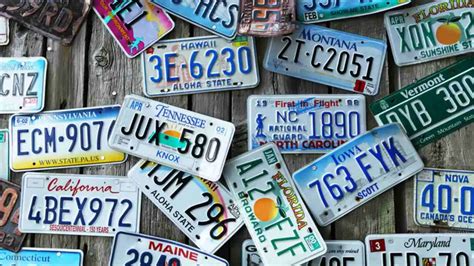Introduction

License plates are essential for identifying and registering vehicles. However, when it comes time to replace them, you may be unsure about the proper disposal method. This guide will provide a comprehensive overview of the options available for safely and responsibly discarding your old license plates.
Legal Considerations
Before disposing of your license plates, it’s crucial to understand the legal implications involved. In many jurisdictions:
- It is illegal to possess an unattached license plate.
- You must surrender your old plates to the appropriate motor vehicle department when you receive new ones.
- Failure to dispose of plates properly can result in fines or other penalties.
Disposal Options
1. Surrender to the DMV
The most common and preferred method of disposal is to surrender your old license plates to the Department of Motor Vehicles (DMV). This is typically done when you obtain new plates for your vehicle. The DMV will destroy the plates and ensure their proper disposal.
2. Recycling
License plates are typically made of metal, which makes them recyclable. You can drop them off at local recycling centers or scrap metal yards. Remember to remove any plastic or reflective material before recycling.
3. Disposal at Authorized Facilities
Some law enforcement agencies, vehicle inspection stations, and automotive repair shops may also offer license plate disposal services. Contact the facility to inquire about their disposal procedures and fees, if any.
Creative Repurposing
While it’s not recommended to display old license plates on your vehicle, there are creative ways to repurpose them:
- Wall Art: Frame plates with unique designs or sentimental value for wall décor.
- Planter Holders: Drill holes into plates and use them to support small plants or herbs.
- Key Chains: Cut out shapes from license plates and attach them to key rings.
- Jewelry: Craft pendants, earrings, or bracelets using small pieces of license plates.
Environmental Considerations
License plates contain potentially hazardous materials, such as lead and mercury. Proper disposal ensures that these materials are not released into the environment, minimizing their impact on human health and ecosystems.
Returning Plates to the Issuing Agency
Some states, such as California, require the return of old license plates to the California Department of Motor Vehicles (DMV). This is to prevent fraudulent use or duplication of plates. Failure to return plates may result in a citation or penalties.
FAQs
Q: Can I throw license plates in the garbage?
A: No, it is illegal to dispose of license plates in the garbage.
Q: Can I sell my old license plates?
A: It is illegal to sell or transfer license plates to another person.
Q: What should I do if I have lost a license plate?
A: Report the lost plate to the DMV immediately and obtain a replacement.
Q: Can I keep old license plates for collection purposes?
A: In some jurisdictions, it may be allowed to keep old license plates for collection purposes. However, you should check with local authorities for specific regulations.
Useful Tables
| Disposal Method | Pros | Cons |
|---|---|---|
| Surrender to DMV | Legal, convenient, free | May require a visit to the DMV |
| Recycling | Environmental, cost-effective | Not accepted at all recycling centers |
| Disposal at Authorized Facilities | Secure, convenient, may incur fees | Not available everywhere |
| Creative Repurposing | Unique, personal expression | May involve modification of plates |
Strategies for Responsible Disposal
- Always remove plastic and reflective materials from license plates before recycling.
- Dispose of license plates promptly to prevent theft or misuse.
- Consider the environmental impact of disposal methods and opt for green options.
- If unsure about the proper disposal procedures, contact your local DMV or law enforcement agency.
Comparison of Pros and Cons
| Disposal Method | Pros | Cons |
|---|---|---|
| Surrender to DMV | Legal, convenient | Requires a visit to the DMV |
| Recycling | Environmental, cost-effective | Not always accepted |
| Creative Repurposing | Unique, personal | May involve modification |
Conclusion
Disposing of license plates responsibly is essential for legal compliance, environmental protection, and minimizing security risks. By following the guidelines outlined in this guide, you can ensure that your old license plates are properly discarded, whether through official channels or creative repurposing.
